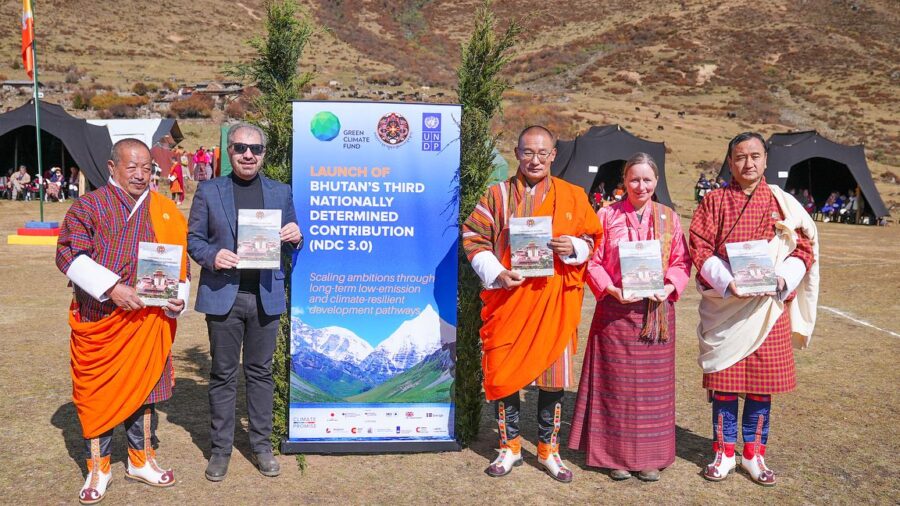Australia’s huge impact on world’s most isolated country Bhutan
It’s one of the most isolated and secretive nations on the planet. But a recent phenonemon has seen its people fleeing in droves.

By Carla Mascarenhas
It’s been labelled the happiest nation on Earth.
Bhutan is a tiny piece of paradise landlocked between two feuding superpowers – China and India.
It’s certainly beautiful. The Himalayan mountains in the north rise from the country’s lush subtropical plains in the south.
It’s also isolated. Until recently, Bhutan had cut itself off from the world. Foreigners were not allowed in until the 1970s, to protect the country’s cultural identity.
Even now, very few tourists are allowed in the country.
But another story is slowly emerging too, the story of the steady stream of young people leaving the country, particularly to Australia.
Since June last year, 1.4 per cent of Bhutan’s population has been granted a visa to go to Australia – a huge proportion that’s growing, in a country of just 760,000.
Bunty Avieson, an academic at the University of Sydney, who has lived in Bhutan on and off since 2007 and written two books about the country, told news.com.au that Australia and Bhutan have always had “strong connections”.
“Australia has had a long relationship with Bhutan that is perhaps not visible in mainstream Australia but is very visible in different pockets like the government,” she said.

Dr Avieson traces the connection back to 1962 when it was Australia that brought Bhutan into the Colombo Plan, a regional intergovernmental organisation.
Those ties, she said, have been strengthened over the decades, particularly through education.
It started in the 1980s when the King of Bhutan sent five high school graduates to different countries to learn skills and bring them back to Bhutan.
One of those, Kinley Dorji, who went to Australia, came home to set up the country’s first newspaper.
Since then, Bhutanese young people continue to flock Down Under due to Australia’s growing brand as an international education destination.
Dr Avieson said while young people were very connected to their homeland due to its culture and strong community ties, there are few job prospects.
Bhutan is among the least-developed countries in the world, with a gross domestic product down there with the likes of Greenland.
Covid only exacerbated the issue.
“This surge to Australia is partly a reflection of that economic suffering, particularly after Covid,” she said. “It is tough here at the moment, it is tough everywhere.”
But she said the tiny nation had a lot going for it, that would help it ride out these current difficulties.

“The young people who haven’t left are creating new roles for themselves, like opening Bhutan’s first pet shop and tech start-ups,” she said.
“The biggest strengths are culture and community, ties you just don’t see in the west,” she said. “And wherever they are, Bhutanese stay connected to their families, their communities and what’s going on in Bhutan via WhatsApp and WeChat.”
A large part of the pride Bhutanese people have for their country comes back to the Dragon King, or Druk Gyalpo.
The Bhutanese monarchy has ruled the country since 1907 and King Jigme Khesar Namgyel Wangchuck is immensely popular.
Highly charismatic, his popularity surged after he married commoner Jetsun Pema – their wedding became the country’s largest media event.
In fact the King and his wife are known as the “Kate and Wills of the Himalayas” due to their charm.
But Dr Avieson noted The King had also done “some extraordinary things” that were deserving of his popularity, citing the community service program he started, known as ‘guardian of peace’.
“It’s like boy scouts and Girl Guides on steroids,” she joked.
“During Covid they went door to door checking everyone was OK, checking rural people were OK and everyone had chilli and rice.”
He has now upskilled these 35,000 volunteers by giving them free courses in everything from hair dressing, to fitness to tree planting so they can volunteer further to the community.

Opportunity key to stopping exodus
Yedzin Tobgay writes in The Diplomat that “locally there is plenty of apprehension and concerns” around the growing exodus of young people.
“Almost every second day, there is a new story or editorial asking the same questions: ‘Why are our youth leaving?’
“The answer, many say, is simply ‘Gokap ra mindu!’ (‘There are no opportunities!’).”
Bhutanese Prime Minister Lotay Tshering acknowledged these concerns in an interview with the ABC this week.
“The trend can be worrying,” he said. “At the same time, these are all professionals, and we leave it up to their expectations and I think it’s the job of the government to make sure their expectations should be met, be it in the country or outside the country.”
But Dr Tshering promised “going forward” his government would do “whatever we can to create jobs that are up to the expectations of the growing youth.”




